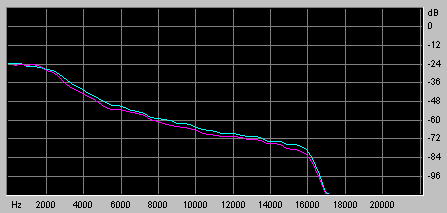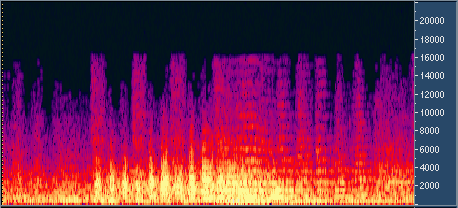
128kb/s HQ MP3 Frequency Response

128kb/s HQ MP3 Spectral View
Here we have the results of testing at 128kb/s. You
can see that the frequency response is faithfully reproduced up
to nearly 16kHz but falls of rapidly above this. The spectral graph
also shows no content above 17kHz. Take note that in the 10khz to
16kHz range you can clearly see how the lower intensity content
has been pruned. This is where the codec is exploiting the masking
effect.
It is this lack of low intensity high frequency content
below 16kHz I believe that is the big shortcoming of encoding music
at 128kb/s.
Listening tests also reveal the shortcomings of encoding
at this bitrate. Some encoding artifacts heard as odd noises are
evident and would be distracting for serious listening. The harpsichord
notes are slightly muffled and the trumpet valve noises almost undetectable.
Overall balance and robustness of the sound is good though.
There is certain content that 128kb/s MP3 does not
handle well at all. On another test recording I have done from a
live performance of Coming Home from Local Hero the encoding artifacts
are so bad that the content sounds artificial. At the start of the
recording there is a lot of applause from the audience and then
a synthesizer starts playing a chord. At 128kb/s the applause sounds
unnatural and there is bad phase distortion on the synthesizer.
At higher encoding rates the problem disappears.
My opinion is that 128kb/s MP3 is great for mobile
use and less critical material such as metal or heavy rock. If your
tastes run to instrumental music, "unplugged" vocal music
or classical music you are definitely going to want to use higher
encoding rates. This format is good enough for music center type
use but definitely not good enough to be considered Hi-Fi.
The low CPU overhead of about 22% on my machine and
efficient 12:1 encoding ratio makes it a great format for playing
music while working on the PC.
[Back] [Next]